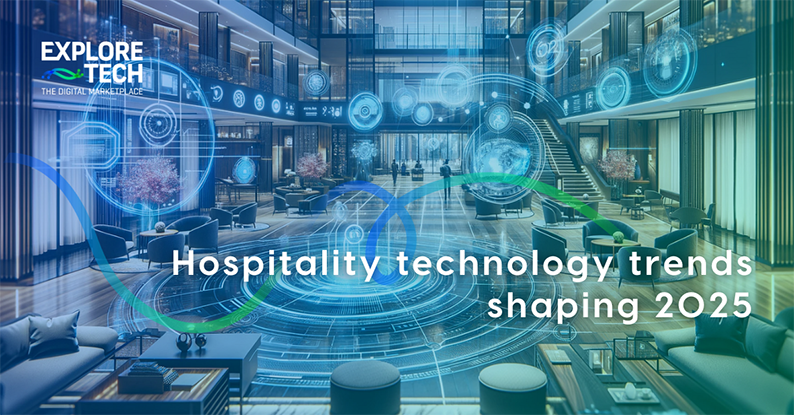
The hospitality industry across the Middle East and Africa (MEA) is gearing up for a transformational 2025. With rapid technological advancements and shifting guest expectations, the landscape is poised to change in ways that will not only streamline operations but also enhance guest experiences to unprecedented levels. As we look ahead, it’s crucial to understand the trends that will define this evolution.
In this article, we explore the key technology trends set to shape the MEA hospitality industry in 2025, drawing on valuable insights and expertise from ExploreTECH's industry specialists. By consulting with our experts, we’ve highlighted how these trends are already transforming the region and what they mean for hoteliers and technology providers alike. Understanding these developments is the first step toward thriving in the year ahead.
Reflecting on 2024: A year of resilience and renewal
Before we dive into what’s next, it's worth acknowledging the progress the MEA hospitality industry has made in 2024. The region saw significant recovery following the pandemic's disruptions. Hotel occupancy rates and RevPAR (revenue per available room) showed positive growth, signaling a rebound that was both hard-won and sustainable.
However, this recovery wasn't without its challenges. Geopolitical uncertainties, inflationary pressures, and labor shortages were persistent issues. Yet, hoteliers have demonstrated resilience in navigating these obstacles, adapting quickly, and strategically positioning themselves for growth in 2025. This experience has equipped industry leaders with the insights needed to embrace new technologies that will enable them to thrive amid the uncertainties of the future.
With that in mind, let’s explore the top hospitality technology trends that will define 2025.
Table of contents
- AI will drive hyper-personalized guest experiences
- Staff productivity will see a tech-enabled boost
- The shift towards direct bookings will gain momentum
- Sustainability will anchor investment decisions
- Enhanced payment solutions will streamline operations
AI will drive hyper-personalized guest experiences
In 2025, artificial intelligence (AI) will be at the forefront of creating hyper-personalized guest experiences across MEA hotels. Hoteliers have long struggled to make sense of the vast amounts of guest data they collect — from booking habits and preferences to on-site interactions. With AI, however, hotels will be able to unlock actionable insights from this data to deliver truly customized experiences.
For example, AI-powered systems can analyze guest preferences and suggest personalized room settings, such as ideal lighting and temperature, even before the guest checks in. In addition, AI-enabled chatbots will be able to assist guests with booking inquiries, requests for local recommendations, and even provide real-time updates on room readiness or local events.
An example of this already happening in the region is the use of AI chatbots by Emirates Palace in Abu Dhabi, which engage with guests via multiple channels to create a seamless experience. Whether it’s adjusting a room setting, ordering room service, or offering curated dining options, these AI solutions are helping deliver a level of personalization that was previously unimaginable.
The ability to offer these personalized experiences not only enhances guest satisfaction but also drives customer loyalty — a critical advantage in the competitive MEA hospitality market.
Staff productivity will see a tech-enabled boost
While hospitality is a service-driven industry, labor shortages and productivity challenges have been a long-standing concern for the MEA region. In 2025, however, technology—particularly AI and automation—will allow hotel staff to focus more on high-value guest interactions rather than repetitive tasks.
Automation tools will be able to handle back-end functions like inventory management, room assignments, and even pre-check-in procedures. For example, AI systems can automatically sort and respond to routine guest inquiries, freeing up front-desk staff to spend more time assisting with personalized requests and addressing guest concerns.
A great example of this shift can be seen in the use of AI-powered systems at the JW Marriott Marquis in Dubai. The hotel has implemented an AI-based room service system, where guests can place orders via a smartphone app, and the AI manages inventory and prepares deliveries accordingly. This system ensures that guests receive swift service while staff can focus on providing high-touch, personalized attention where it matters most.
By leveraging AI and automation, MEA hoteliers can enhance both staff productivity and guest satisfaction, ultimately leading to higher employee retention and lower operational costs.
The shift towards direct bookings will gain momentum
Online Travel Agencies (OTAs) have long been the dominant force in hospitality distribution, offering global reach at the cost of commission fees. However, in 2025, we expect to see a shift toward direct bookings, driven by several factors, including legislative changes and the increasing ability for hotels to offer personalized booking experiences.
AI-powered search platforms, like Google’s AI-driven travel search and ChatGPT-style tools, are providing travelers with curated, personalized recommendations that reduce the reliance on generic search results. With these tools, hotels can integrate directly into the guest’s booking journey, offering tailored suggestions based on past travel behaviors or preferences.
In the MEA region, initiatives like Dubai’s Tourism Vision 2025 and Abu Dhabi’s Department of Culture and Tourism have been focusing on empowering hotels to boost their direct booking channels. One prominent example is the introduction of the "Dubai Experience" app, which allows tourists to book directly with hotels while accessing exclusive offers and content tailored to their interests.
For hoteliers, embracing direct bookings means investing in seamless, user-friendly booking engines and offering value-added services like flexible cancellation policies or loyalty programs that make direct bookings more appealing. By leveraging technologies like AI, location-based services, and personalized offers, hotels can foster direct relationships with their guests, reducing their dependency on OTAs and improving profitability.
Sustainability will anchor investment decisions
Sustainability is no longer just a buzzword; it’s a driving force behind investment decisions across the MEA hospitality sector. As travelers become more environmentally conscious, hotels must respond by embracing green technologies and sustainable practices, both to attract eco-minded travelers and comply with increasingly stringent government regulations.
Sustainability-driven technology will include energy management systems, waste reduction tools, and water-saving innovations. AI-powered systems will help monitor and control energy consumption in real-time, optimizing heating, cooling, and lighting for energy efficiency. Additionally, solar energy and other renewable resources will play an increasingly significant role in hotel operations, reducing both costs and environmental impact.
The Four Seasons Resort Dubai at Jumeirah Beach is an excellent example of sustainability efforts in the region. The resort has implemented an AI-based energy management system to reduce energy usage without compromising guest comfort. They’ve also embraced sustainable sourcing in their food and beverage operations, aligning with both guest expectations and local environmental goals.
In 2025, investing in sustainability will not only be good for the environment but will also enhance brand reputation and attract a growing segment of eco-conscious travelers.
Enhanced payment solutions will streamline operations
As the digital economy continues to expand, payment solutions in the hospitality industry are becoming more sophisticated and secure. In 2025, hotels in the MEA region will adopt enhanced payment systems that integrate mobile wallets, biometric authentication, and contactless payment options.
The rise of digital wallets like Apple Pay, Google Pay, and regional platforms such as Mada in Saudi Arabia and NAPS in Egypt will streamline payment processing for guests while reducing transaction times. Additionally, the integration of biometric payment systems, such as facial recognition, will enhance guest convenience and security.
The Ritz-Carlton in Dubai has already begun testing contactless payment options throughout its properties, including for room service, spa services, and even poolside refreshments. By implementing these technologies, the hotel enhances both guest convenience and operational efficiency, ensuring smoother, more secure transactions.
These advanced payment systems not only improve the guest experience but also help hoteliers manage operations more efficiently, reducing the complexity of multi-currency transactions and enhancing revenue management.
Conclusion
As the MEA hospitality industry gears up for 2025, these technology trends are set to redefine the way hotels operate and engage with guests. From AI-driven personalization and automation boosting staff productivity to the shift toward direct bookings and a renewed focus on sustainability, technology will be a key enabler of success in the year ahead. By embracing these trends, hoteliers can stay ahead of the curve and ensure that they are ready to meet the evolving demands of the modern traveler.
The future is now, and the time to adapt is today. With the right technological investments and strategies, the MEA hospitality industry can confidently step into 2025, ready to offer unforgettable experiences to guests while maximizing operational efficiency and profitability.

ExploreTECH Content Team
admin


